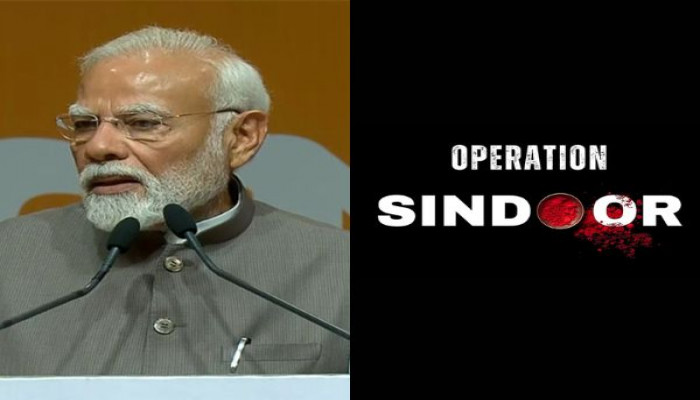Modi terms May 7 strikes a turning point, says terrorism no longer just a proxy war
- In Reports
- 05:55 PM, May 27, 2025
- Myind Staff
Prime Minister Narendra Modi on Tuesday announced India would no longer look at acts of terrorism as merely a proxy war. He referred to the May 7 strikes against nine terror camps in Pakistan and Pakistan-occupied Kashmir (PoK) as a turning point. He added that the strikes were in response to a planned war on India.
Prime Minister Narendra Modi addressed from Gandhinagar, on the second day of his first visit to his home state, Gujarat, after the launch of Operation Sindoor. He stated, "Until now, we used to call these terror attacks a proxy war. But after the May 7 [Operation Sindoor strikes], we can no longer make the mistake of calling it a proxy war."
Modi arrived in Gujarat on Monday, which marked the 11th anniversary of his taking office as prime minister. He said the armed forces identified nine terror locations after the April 22 Pahalgam terror attack. They destroyed those targets in 22 minutes. The terror attacks could not be referred to as a proxy war anymore. He explained that Pakistan held state funerals for the terrorists killed in the cross-border strikes.
He stated, "The funerals of these terrorists were state-sponsored. Pakistan’s flags were placed on their coffins, and their army saluted them… This was a planned strategy. It is a planned war." He further stated that India did not need to provide any evidence. He said the videos Pakistan released of the last rites were enough. The terrorists were backed by the Pakistan Army had attacked innocent pilgrims, passengers, and tourists.
Modi linked the cross-border strikes with decades of unresolved aggression from the other side of the border. He spoke about the partition of India and said the first terror attack occurred in Kashmir. He said that a part of India’s land was taken then. The partition marked the beginning of terror attacks. If the terrorists had been eliminated the same day, the history of terrorism in the region could have been different. Sardar Vallabhbhai Patel had wanted the Indian Army to remain in Kashmir until PoK was reclaimed.
He added, "If we had followed Sardar Patel’s insistence that the Army should not stop until we reclaimed PoK, perhaps things would have been different. These terrorists who tasted blood kept repeating their acts." He called the Pahalgam attack an inhuman part of long-standing cross-border hostility. The country had tolerated such attacks for 75 years.
He declared, "But no more.... We tolerated it for too long. Should we not respond strongly? Should we not remove the thorn? Whenever there was a war, the Indian armed forces made them bite the dust. Pakistan realised that they cannot win, hence they started supporting terrorism."
He said India always stood for peace and upheld the ancient philosophy of Vasudhaiva Kutumbakam, which means the world is one family. "We want everyone, including our neighbours, to live in peace. But when we are provoked, they must remember that this land also belongs to the brave."
He referred to the Indus Waters Treaty with Pakistan, which India put in abeyance after the Pahalgam attack. India had not even begun to fully use the water it was entitled to under the agreement. The treaty was so one-sided that even desilting was not allowed. "Only 2-3% water was left for us. We have not done much yet, but even that has made them sweat." India’s approach had always focused on development and cooperation. "We were working for the good of all. We even helped them in times of trouble. And in return, we got rivers of blood."
India’s economy stood at number 11 in the world when PM Modi took over in 2014. "Despite fighting Covid and multiple natural challenges, we are now the fourth largest economy," he added. PM Modi highlighted India’s economic growth and added that it had overtaken the United Kingdom, which ruled India for 250 years.
The country was eager to become the third-largest economy in the world. "Nobody is ready to wait… if anyone asks to wait, there is a loud shout from behind saying it is possible if Modi is there." He said cities had to be transformed into economic growth centres if India was to become a developed nation by 2047. A roadmap had to be prepared now.
He said, "Gujarat will have to now set goals for its all-round development in 2035, when it celebrates 75 years of statehood… One year later, it should be ready for the Olympics. People of the country want the Olympics to be held in India."
"They pointed to the absence of mineral resources, its harsh geography of sea and desert, and a population largely engaged in trade. But today, the land once known for producing salt is known for diamonds." He said critics had questioned what Gujarat would achieve when it was carved out of Bombay state in 1960.
Modi launched the Urban Development Year 2025 in Gandhinagar. It marked a new roadmap for urban progress in Gujarat.







Comments